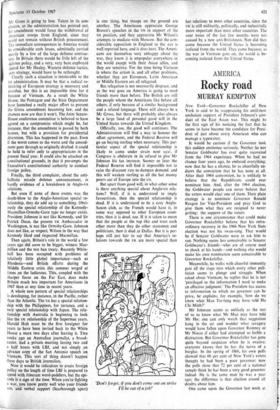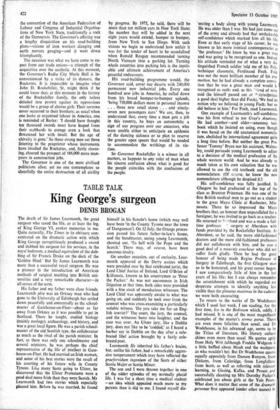Rocky road
AMERICA MURRAY KEMPTON
New York—Governor Rockefeller of New York is said to be reappraising his until-now unshaken support of President Johnson's con- duCt of the East Asian war. This might be the first sign of his noticing the fact that he seems to have become the candidate for Presi- dent of just about every American who can manage a typewriter. It would be curious if the Governor took this sudden eminence seriously. Neither he nor Senator Goldwater has ever quite recovered from the 1964 experience. When he had no chance four years ago, he endured everything; now that he has a chance, he as cheerfully en- dures the conviction that he has none at all. After their 1964 convention, he is unlikely to believe that the Republicans could ever nominate him. And, after the 1964 election, the Goldwater people can never believe that the voters would elect one of them. Their plain strategy is to nominate Governor Ronald Reagan for Vice-President and pray God to give them what they are resigned to never getting : the support of the voters.
There is one circumstance that could make Governor Rockefeller believe that his extra- ordinary recovery in the 1966 New York State election was not his swan-song. That would be if Senator Goldwater were to ask him to run. Nothing seems less conceivable to Senator Goldwater's friends—who are of course used to shock at his hands—and nothing else would make his own nomination seem conceivable to Governor Rockefeller.
Meanwhile, he walks with cheerful immunity past all the traps into which every other poli- tician seems to plunge and struggle. When asked about Vietnam, he replies that he is not `privileged to the information I need to make an effective judgment.' The President has access to information to which no governor can be privy, he explains; for example, 'how do we know what Mao Tse-tung may have told Ho Chi Minh?'
Mr Johnson seems as unlikely as the rest of us to know what Mr Mao may have told Mr Ho; one can only watch that suggestion hang in the air and wonder what savagery would have fallen upon Governor Romney or Mr Nixon if either had attempted so feeble a distraction. But Governor Rockefeller has lone quite beyond suspicion when he is evasive; everyone knows that he has the nerve of a burglar. In the spring of 1966, his own polls showed that 66 per cent of New York's voters thought he had been a poor governor; now the polls show that 72 per cent of a national sample think he has been a very good governor indeed. He is the same man he was a year ago; the difference is that election erased all doubts about him.
One came upon the Governor last week at
the convention of the American Federation of Labour and Congress of Industrial Organisa- tions of New York State, traditionally a rock of the Democrats. The Governor's offering was a lengthy disquisition on his road-building plans—visions of iron workers clanging and earth movers gouging—and it went down triumphantly.
The occasion was what we have come to ex- pect from our trade unions—a triumph of the acquisitive over the aesthetic. At this moment, the Governor's Radio City Music Hall is in- convenienced by a strike of its dancers, the Rockettes. It is impossible to imagine what John D. Rockefeller, Sr, might think if he could know that, at this moment in the history of the Rockefeller family, the only toilers deluded into protest against its oppressions would be a group of chorus girls. Their sorrows never occurred to their brothers; as usual when one looks at organised labour in America, one is reminded of Burke: 'I should have thought ten thousand swords must have leaped from their scabbards to avenge even a look that threatened her with insult. But the age of chivalry is gone.' So those strong men sat there listening to the proprietor whose instruments have insulted the Rockettes, and, fairly slaver- ing, cheered the prospect of 186,000 more man- years in construction jobs.
The Governor is one of the most civilised politicians alive; yet no one contemplates so cheerfully the entire destruction of all civility by progress. By 1975, he said, there will be more than ten million cars in New York State; the number that will be added in the next eight years would extend, bumper to bumper, from New York to San Diego. With such visions we begin to understand how unfair it was for the tender of heart to be scandalised when Ronald Reagan recommended turning North Vietnam into a parking lot. Turning whole countries into parking lots is the inevit- able and ultimate achievement of America's peaceful endeavours.
His road-building programme would, the Governor said, cover our deserts with 240,000 permanent new industrial jobs. Every one hundred new jobs in America, he called down from his broad bumper-to-bumper uplands, 'bring 710,000 dollars more in personal income . . . three new retail stores . . . and ninety- seven new passengers cars.' We are, then, to understand that, every time a man gets a job in this country, he buys an automobile; a sign of our progress over our ancestors, who were unable either to anticipate an epidemic of the dancing sickness or to plan to reserve the greater open spaces that would be needed to accommodate the writhings of its vic- tims.
So Governor Rockefeller is a winner in all matters, as happens to any ruler of man when his sincere confusion about what is good for the people coincides with the confusions of the people.



































 Previous page
Previous page